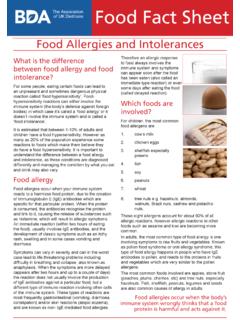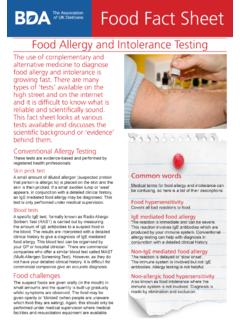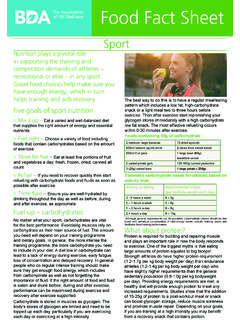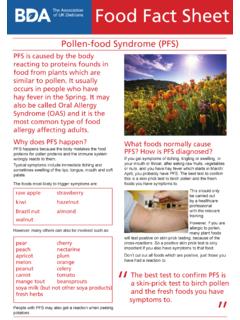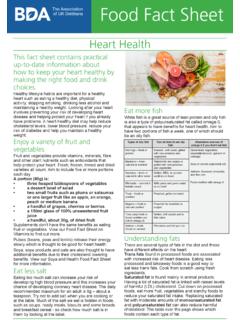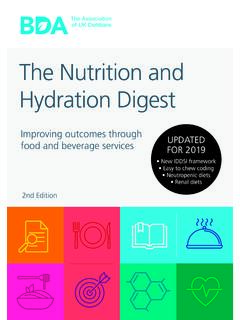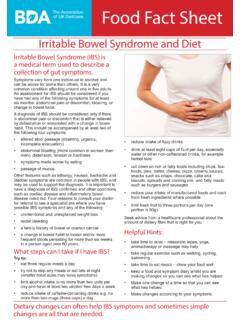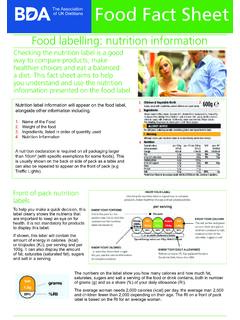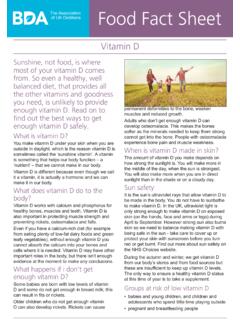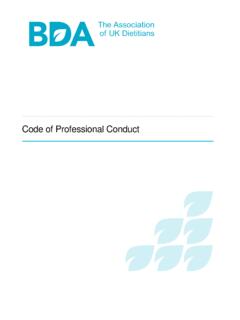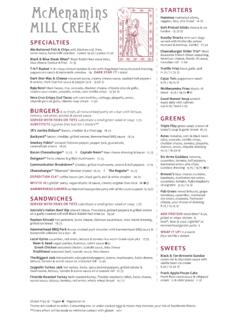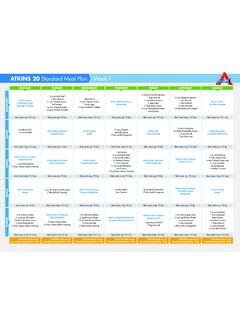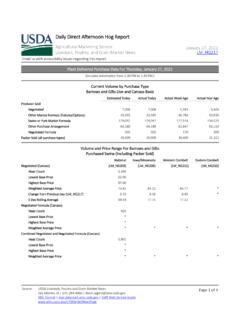Transcription of Folic Acid Food Fact Sheet - bda.uk.com
1 Folic AcidPregnancy and lactation (breastfeeding) Folic acid is a B vitamin which is vital for the formation of red blood cells. The form of Folic acid occurring naturally in food is termed folate . What does Folic acid do? Folic acid, together with vitamin B12, is necessary to form red blood cells. A deficiency of Folic acid can reduce the ability of red blood cells to carry oxygen, this is called macrocytic (large cell) anaemia. Together, both vitamins also help nerves to function properly. Folic acid is also essential in the formation of DNA (genetic material) within every body cell, allowing each cell to replicate of Folic acidFolate is found naturally in a wide variety of foods, and is also present in foods fortified with Folic acid.
2 As Folic acid is a water-soluble vitamin (dissolves easily in water), it is lost from vegetables during cooking. This can be reduced by avoiding over-cooking, and steaming or microwaving vegetables instead of much Folic acid do I need?If you are not likely to become pregnant, you should be able to obtain sufficient amounts of folate in their diet by eating a healthy diet containing a wide variety of happens if I don t get enough? Folic acid deficiency can result in some general symptoms tiredness (caused by anaemia), weakness, diarrhoea, loss of appetite and weight loss.
3 A lack of Folic acid can also cause headaches, heart palpitations, a sore tongue and behavioural disorders. Deficiency can occur if you are not getting enough folate in your diet or if requirements increase (such as during pregnancy).Sometimes you can become deficient because you are losing lots of Folic acid losses (such as in Crohn s disease or untreated coeliac disease), if you are using some medications such as water tablets (diuretics), or in Fact SheetDaily recommendations for folate ( Folic acid) intake ( g = micrograms)Adults and children over 11 years: 200 g Anyone considering pregnancy: 200 g plus a supplement* containing 400 g Pregnant people.
4 300 g plus a 400 g supplement* during the first 12 weeks of pregnancyLactating people: 260 g *You may need to take 5mg/d of Folic acid preconception and up to 12 weeks of pregnancy if you have had a pregnancy previously affected by neural tube defects or if you have diabetes or take anti-epilepsy medication - ask your doctor.)The foetus rapidly develops spine and nerve cells in the first few weeks of pregnancy. Inadequate blood levels of folate at this crucial time increase the risk of the baby s spine developing a neural tube defect , resulting in spinal malformation called spina this reason, anyone considering pregnancy, and up to 12 weeks of pregnancy is advised to.
5 Take a Folic acid supplement, or pregnancy specific vitamin supplement providing 400 g every day Eat a diet rich in folates and Folic acid from foods naturally containing the vitamin and from fortified foodsDuring the whole of pregnancy and lactation, it is advisable to eat a diet rich in folate as requirements for the vitamin are acid and heart diseaseResearch has demonstrated that Folic acid supplements can reduce high levels of homocysteine an amino acid in the blood that irritates blood vessels which has been associated with increased risk of heart attack or high level of homocysteine is found in populations with a high incidence of heart disease, which is the main cause of death in the UK.
6 However, reducing homocysteine levels does not reduce rates of heart attacks or deaths from any cause. Homocysteine level is thought to be an indicator rather than a risk factor for heart disease. Recent research has shown a slight reduction in stroke with Folic acid supplementation but results are inconclusive and more research is required to understand this acid supplements and food fortificationDespite recommendations, many people do not take Folic acid supplements in early pregnancy and many pregnancies are unplanned.
7 Routine fortification of flour with Folic acid is a simple way to increase Folic acid intake for everyone. Many countries, such as the USA and Canada, have introduced mandatory fortification of flour with Folic acid, and seen a significant reduction of the number of neural tube defect births. This Food Factsheet is a public service of The British Dietetic Association (BDA) intended for information only. It is not a substitute for proper medical diagnosis or dietary advice given by a dietitian. If you need to see a dietitian, visit your GP for a referral or: for a private dietitian.
8 To check your dietitian is registered check This Food Fact Sheet and others are available to download free of charge at by Dr Gail Rees information sources used to develop this fact Sheet are available at BDA August date August sources of Folic acid: spinach, kale, Brussels sprouts, cabbage, broccoli beans and legumes ( peas, blackeye beans) yeast and beef extracts oranges and orange juice wheat bran and other whole grain foods poultry, pork , shellfish and liver fortified foods ( some brands of breakfast cereals check the label).
9 The UK government is currently considering mandatory fortification of flour with Folic acid. A recent review of scientific research has not found evidence of increased health risks. The UK Chief Medical Officers and the British Dietetic Association strongly support mandatory fortification of flour with Folic I take too much?It is advisable for those aged over 50 years or those with a history of bowel cancer, not to take Folic acid supplements containing more than 200 g/day.
10 For other people, long-term intakes of Folic acid from fortified foods and supplements should be below 1mg/ day for adults (lower amounts for children), although this limit is currently being people (other than people who are or could become pregnant) should be able to obtain sufficient folate in their diet by eating plenty of vegetables, fruit, beans and wholegrains. These foods will be naturally high in folate and may protect against bowel cancer and heart disease.
